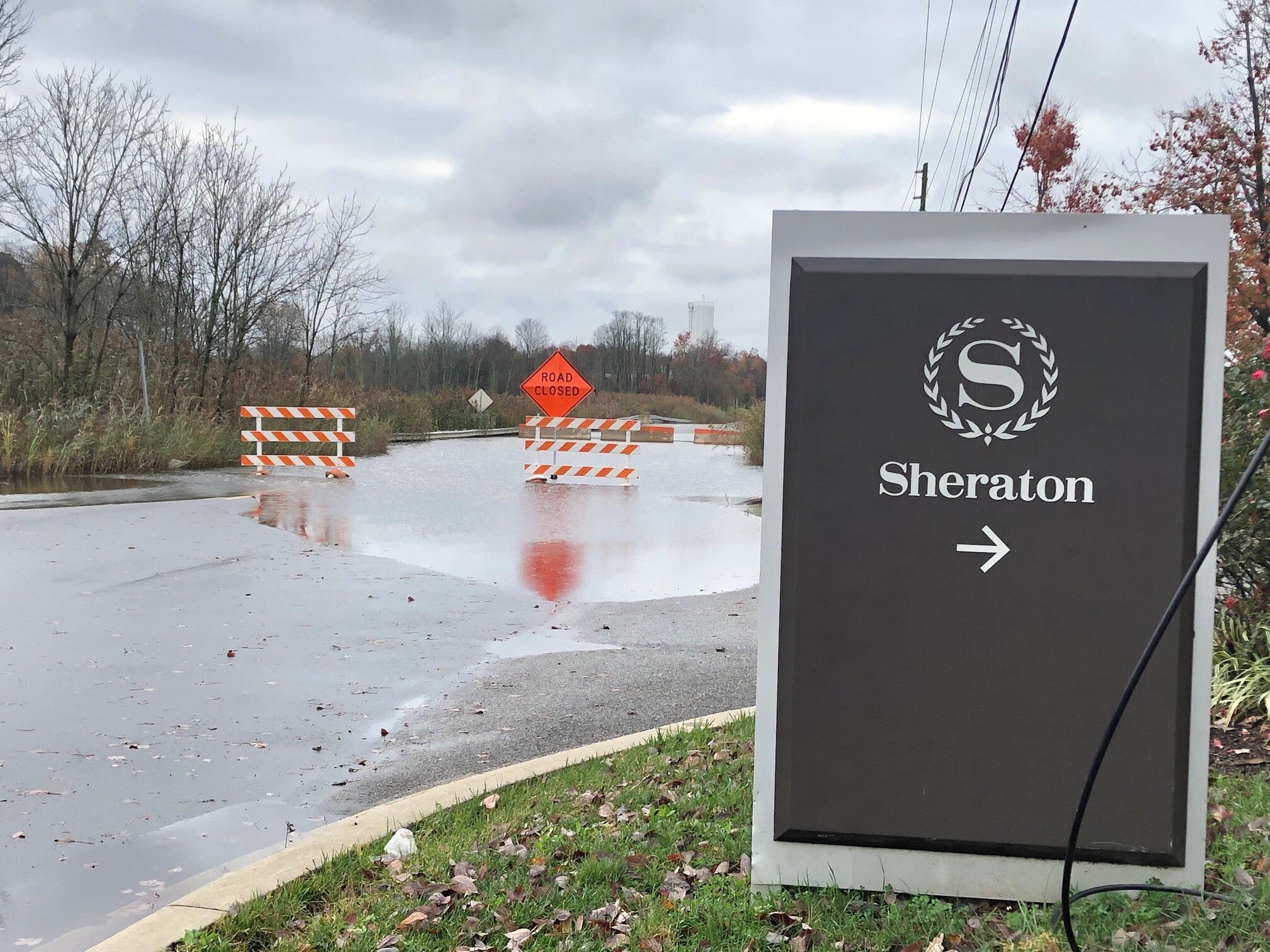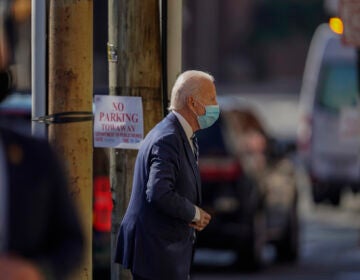‘Swamp Hotel’ bought by New Castle County for $19.5M to serve homeless people
The remote hotel near wetlands off I-95 south of Wilmington led to struggles attracting guests. The county snapped it up at auction using federal coronavirus relief money.
Listen 2:32
The Sheraton along Interstate 95 south of Wilmington has been sold to serve people experiencing homeless. (Cris Barrish/WHYY)
After heavy rains, one of the main access roads to the Sheraton hotel along Interstate 95 south of Wilmington is so flooded that authorities must block it off.
Hence its nickname in some local circles as the Swamp Hotel. That’s just one reason for its failure over nearly two decades to attract enough guests to be a success.
Such was the case Thursday, after torrential rains the previous evening. Old Airport Road had knee-deep water and was impassable, so as usual, the swankish six-story hotel had only a handful of guests.

But in about a month the building with a grand lobby and 192 rooms will no longer be a hotel. Instead, the space will be used as a temporary home to a population the builders and owners never envisioned.
That’s because the administration of New Castle County Executive Matt Meyer, with the unanimous blessings of County Council, recently bought it as an emergency shelter and transition center for people who are homeless.
The county used $19.5 million of the $322 million received from the federal coronavirus CARES Act relief money this year.

County leaders have spent the money in a variety of ways, such as COVID-19 related public safety and other governmental costs, grants for remote education, food distribution and child care centers and shoring up the state’s unemployment fund.
County Executive Matt Meyer acknowledges the use is unusual and might surprise many taxpayers, but said it’s an innovative way to deal with a growing problem.
Housing advocates estimate the county of about 560,000 people has some 1,000 homeless people. It’s become commonplace in recent years for homeless people to panhandle at intersections on and around Kirkwood Highway, the commercial artery that runs from Wilmington to Newark.
“We’ve been giving out motel vouchers in collaboration with the state but the population is expanding. It’s not clear there’s going to be enough beds going into the winter,’’ Meyer told WHYY News this week.
Those dollars help but are only a band-aid, not a comprehensive approach, Meyer said, adding that the pandemic has only worsened the situation.
“What we’ve done effectively is taken the most vulnerable population and said you are going to be safe, segregated in a good way so you are not exposed to the contagion,’’ he said. “But what we haven’t done is provide for sort of wraparound services.”
So Meyer is working with state and nonprofit leaders to provide mental health, substance abuse and other counseling services for the short-term tenants. He hopes to begin accepting people in need of emergency housing before Christmas.
Meyer understands some county taxpayers have apprehensions and admits there are steep challenges such as transportation to the facility halfway between Wilmington and Newark.
“Look, you can’t solve problems if you aren’t willing to take risks,’’ he said. “Sure, we can keep doing what we’re doing and the homeless population will keep growing.
“Any time you stand up and make an expenditure like that there are people who say, ‘Oh, you are going to raise my property taxes for this,’ which is just factually inaccurate.”
Meyer’s gambit does have support. Kim Eppehimer heads the Friendship House that aids homeless people and will have staff at the facility to help people transition to permanent housing.

“I think there’s a lot of ways it could go awry,’’ she said with a chuckle, but said the goal is worthwhile and can succeed.
“I think it’s a really smart, intelligent response to the needs of the community,’’ she said, “especially with winter and COVID approaching.”

Get daily updates from WHYY News!
WHYY is your source for fact-based, in-depth journalism and information. As a nonprofit organization, we rely on financial support from readers like you. Please give today.






